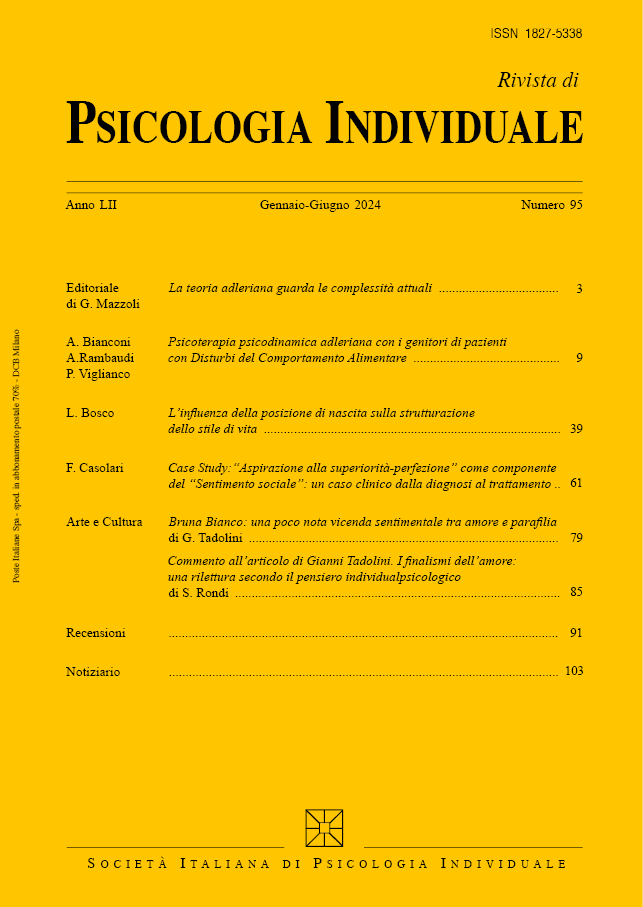Un approccio etologico ai fondamenti della Psicologia individuale
Parole chiave:
sentimento sociale, predisposizione, apprendimento, etologia, filogenesi, ontogenesi, adattamentoAbstract
Il contributo propone una rilettura della psicologia individuale come “sistema aperto”, capace di dialogare con il campo culturale e scientifico contemporaneo. Per mantenere la propria rilevanza, la psicologia individuale deve evolversi, integrando i progressi di altre discipline, in particolare delle scienze biologiche. Pur essendo una psicologia antropomorfica, non modellata sulle scienze naturali, essa possiede un nucleo psicobiologico rappresentato dal sentimento sociale e dall’aspirazione alla superiorità. Il testo si concentra sull’importanza dell’etologia — lo studio del comportamento animale e umano — come chiave interpretativa utile per approfondire i fondamenti della psicologia individuale. Si riconosce il rischio del riduzionismo biologico, ma si sottolinea che la scuola etologica inglese, privilegiata dagli autori, evita tale semplificazione, valorizzando la dimensione culturale dell’essere umano. In questo contesto, si evidenzia l’analogia tra il “comportamento di attaccamento” di Bowlby e il “sentimento sociale” adleriano. L’apertura all’etologia non è una novità assoluta: già Adler fu influenzato da Darwin e, indirettamente, da Kropotkin, entrambi sostenitori della cooperazione come fattore evolutivo. Il sentimento sociale, secondo questa prospettiva, può essere visto come una predisposizione all’apprendimento, facilitata da meccanismi biologici che ne orientano lo sviluppo. Hinde afferma che ogni specie possiede predisposizioni specifiche che guidano l’apprendimento in certi contesti, e l’etologia ha evidenziato l’esistenza di “periodi sensibili” in cui tali apprendimenti avvengono con maggiore efficacia. Lorenz ridefinisce l’innato come ciò che è acquisito filogeneticamente, distinguendolo dall’appreso, che è ontogenetico. Ogni apprendimento richiede meccanismi innati di insegnamento, come il piacere o il dolore, che orientano verso comportamenti adattativi. Adler stesso affermava che “sin dall’inizio di ogni vita psichica esiste uno schema di riferimento che guida verso un atteggiamento sociale”. Infine, l’autore propone una terza via: considerare il sentimento sociale come una categoria funzionale, composta da comportamenti che promuovono la convivenza e la cooperazione, indipendentemente dalle loro cause. Questa prospettiva apre un dialogo profondo tra psicologia individuale ed etologia, valorizzando l’interazione tra biologia, ambiente e cultura






